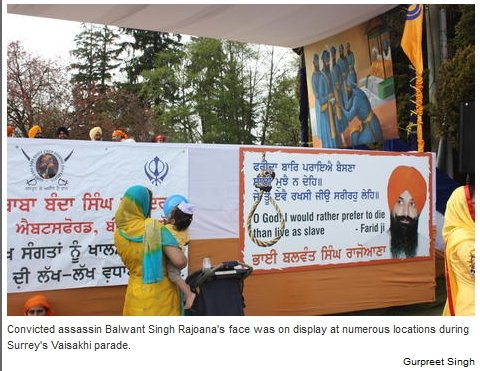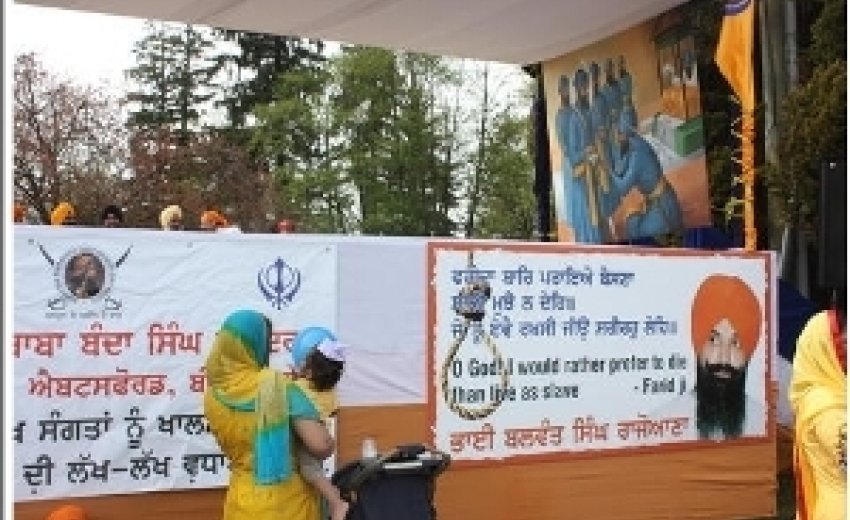
The imagery of a convicted Sikh militant on death row in India, Balwant Singh Rajoana, dominated the annual Vaisakhi parade in Surrey.
His pictures greeted visitors from different corners of the streets as the procession passed through the city Saturday. Slogans were raised in support of Rajoana and ballad singers glorified his action, while others spoke passionately for him from different podiums.
Rajoana is awaiting a death sentence for being involved in the assassination of Punjab chief minister Beant Singh in 1995. The crime was committed by the Babbar Khalsa, a Sikh separatist group now banned in Canada and blamed for the Air India bombings that left 331 people dead in June 1985.
Dilawar Singh, a suicide bomber, triggered the blast outside the Punjab secretariat in Chandigarh, killing Beant Singh and 17 others.
Beant Singh remains a controversial figure in the history of terrorism in Punjab. Victims of various attacks consider him a "martyr", who brought peace in Punjab by crushing terrorism in the name of Khalistan, an imaginary Sikh homeland.
Meanwhile, supporters of Khalistan and human-rights groups accuse him of allowing police brutality that led to mass disappearances and killings of suspects in staged encounters.
Rajoana, who appears to be high on his conviction, not only admits his involvement in the assassination but also wants to be hanged and die as a hero.
Yet a campaign has picked up both in India and Canada to save his life. His supporters want his death sentence commuted to life imprisonment.
It should not be surprising that he has immense support in Surrey, which has a sizeable population of Sikhs. After all, organizers of the Surrey Vaisakhi parade are die-hard supporters of Khalistan.
This year, they honoured the widow of Labh Singh, the slain leader of the Khalistan Commando Force, a group believed to have been in an armed struggle.
Although Rajoana has no Canadian connection, a few elected officials from this country have raised this issue, seeking the intervention of Canada, which has outlawed capital punishment.
Unlike Devinderpal Singh Bhullar (another Sikh militant facing death sentence in India)—who is married to a Canadian citizen and evoked sympathy in this country for obvious reasons—Rajoana has nothing to do with Canada. Still, a series of rallies supporting him have been organized across Canada.
Politicians in India have also tried to score points over each other by opposing his death sentence. Among them is Beant Singh’s own daughter, Gurkanwal Kaur, a Congress leader herself.
She has forgiven Rajoana and is asking for clemency. Certainly, it takes lot of courage to forgive someone who has killed one's dad, but if she really cares for human rights, her Congress party that currently governs India should bring in legislation to end capital punishment, instead of showing mercy in a selective case.
The ruling Akali Dal in Punjab is also seeking clemency for Rajoana while some unknown people are awaiting death sentence in Punjab jails. Do they too not deserve clemency?
If these parties are sincere they should give up their political considerations and honestly work for a civilized society, which has no room for capital punishment. Instead, they pander to the fundamentalist "vote bank" by picking up selective instances of atrocities for short-term gains. By choosing to do so, they are actually bending over their knees before the separatist and theocratic forces.
It is for this reason there was a backlash in Punjab, which resulted in Hindu and Sikh fundamentalists coming to blows. It is pertinent to mention that Sikh extremists targeted Hindus in Punjab when the movement for Khalistan was at its peak, while Hindu extremists frequently attacked the Sikh minority outside Punjab whenever there was anti-Hindu violence in Punjab.
Thousands of Sikhs were systematically killed across India by mobs led by Congress Party leaders following the 1984 assassination of then-Indian prime minister Indira Gandhi by her Sikh bodyguards.
Supporters of Khalistan should reciprocate the gesture of Gurkanwal Kaur and acknowledge the high-handedness of militants who've killed innocent Hindus,moderate Sikhs, families of police officers, scholars, and secular critics.
Khalistan supporters have not forgiven Beant Singh, either. One may disagree with the former chief minister, but he led a war against terrorism in mid 1990s before it had fully entered the consciousness of western countries.
Whereas, the United States only launched a full-scale war against terror after 9/11—and that against sovereign countries like Afghanistan and Iraq—the Beant Singh regime was defending his state from a proxy war in the name of Khalistan that was initiated from Pakistan, a hostile neighbour of India.
Besides, the blast that claimed the life of Beant Singh left many innocent people dead. Instead of facing thus inconvenient reality, the Khalistanis are trying to get a political mileage out of the Rajoana story by showcasing it as an instance of the "unfair judicial system" of India, which has failed to punish perpetrators of the 1984 anti-Sikh carnage.
The Indian establishment has also shown its weakness by continuously denying justice to victims' families, which indirectly strengthens the hands of the Khalistan leadership who is always looking for an opportunity to keep the pot boiling in countries like Canada.
To oppose capital punishment for the sake of ideological reasons like nonviolence and pacifism is one thing, but to oppose it selectively as a part of a political agenda is unacceptable.
Let Rajoana live, but others who do not subscribe to his ideas should also be allowed to live without fear and intimidation.
Gurpreet Singh is Georgia Straight contributor, and the host of a program on Radio India. He's working on a book tentatively titled Canada's 9/11: Lessons from the Air India Bombings.
